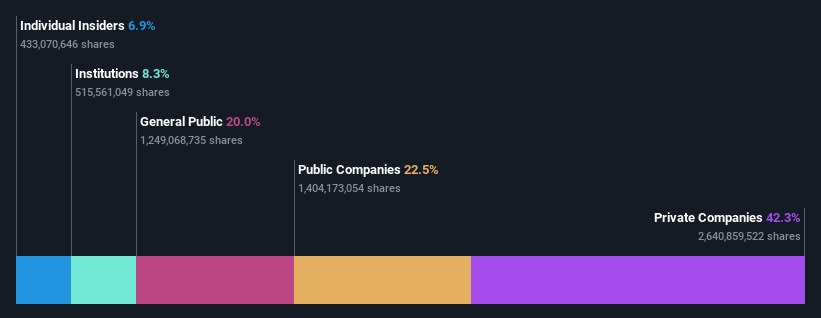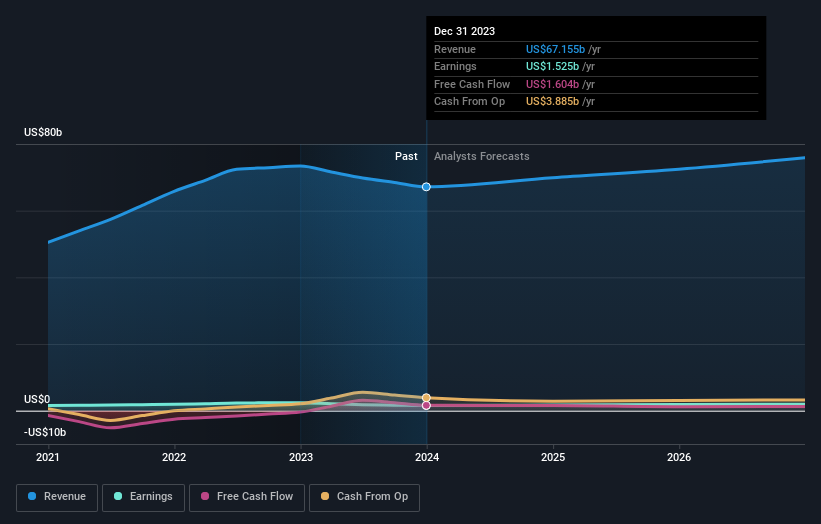Wilmar International Limited (SGX:F34) stock most popular amongst private companies who own 42%, while public companies hold 22%
Key Insights
The considerable ownership by private companies in Wilmar International indicates that they collectively have a greater say in management and business strategy
A total of 3 investors have a majority stake in the company with 56% ownership
Every investor in Wilmar International Limited (SGX:F34) should be aware of the most powerful shareholder groups. And the group that holds the biggest piece of the pie are private companies with 42% ownership. That is, the group stands to benefit the most if the stock rises (or lose the most if there is a downturn).
And public companies on the other hand have a 22% ownership in the company.
Let's delve deeper into each type of owner of Wilmar International, beginning with the chart below.
See our latest analysis for Wilmar International
What Does The Institutional Ownership Tell Us About Wilmar International?
Institutional investors commonly compare their own returns to the returns of a commonly followed index. So they generally do consider buying larger companies that are included in the relevant benchmark index.
Wilmar International already has institutions on the share registry. Indeed, they own a respectable stake in the company. This implies the analysts working for those institutions have looked at the stock and they like it. But just like anyone else, they could be wrong. When multiple institutions own a stock, there's always a risk that they are in a 'crowded trade'. When such a trade goes wrong, multiple parties may compete to sell stock fast. This risk is higher in a company without a history of growth. You can see Wilmar International's historic earnings and revenue below, but keep in mind there's always more to the story.
Wilmar International is not owned by hedge funds. The company's largest shareholder is The Kuok Group, with ownership of 27%. Meanwhile, the second and third largest shareholders, hold 22% and 6.9%, of the shares outstanding, respectively. Additionally, the company's CEO Khoon Hong Kuok directly holds 6.8% of the total shares outstanding.
To make our study more interesting, we found that the top 3 shareholders have a majority ownership in the company, meaning that they are powerful enough to influence the decisions of the company.
Researching institutional ownership is a good way to gauge and filter a stock's expected performance. The same can be achieved by studying analyst sentiments. There are a reasonable number of analysts covering the stock, so it might be useful to find out their aggregate view on the future.
Insider Ownership Of Wilmar International
While the precise definition of an insider can be subjective, almost everyone considers board members to be insiders. Management ultimately answers to the board. However, it is not uncommon for managers to be executive board members, especially if they are a founder or the CEO.
I generally consider insider ownership to be a good thing. However, on some occasions it makes it more difficult for other shareholders to hold the board accountable for decisions.
We can see that insiders own shares in Wilmar International Limited. It is a very large company, and board members collectively own S$1.4b worth of shares (at current prices). we sometimes take an interest in whether they have been buying or selling.
General Public Ownership
The general public, who are usually individual investors, hold a 20% stake in Wilmar International. This size of ownership, while considerable, may not be enough to change company policy if the decision is not in sync with other large shareholders.
Private Company Ownership
We can see that Private Companies own 42%, of the shares on issue. It might be worth looking deeper into this. If related parties, such as insiders, have an interest in one of these private companies, that should be disclosed in the annual report. Private companies may also have a strategic interest in the company.
Public Company Ownership
Public companies currently own 22% of Wilmar International stock. We can't be certain but it is quite possible this is a strategic stake. The businesses may be similar, or work together.
Next Steps:
It's always worth thinking about the different groups who own shares in a company. But to understand Wilmar International better, we need to consider many other factors. Take risks for example - Wilmar International has 3 warning signs (and 1 which makes us a bit uncomfortable) we think you should know about.
But ultimately it is the future, not the past, that will determine how well the owners of this business will do. Therefore we think it advisable to take a look at this free report showing whether analysts are predicting a brighter future.
NB: Figures in this article are calculated using data from the last twelve months, which refer to the 12-month period ending on the last date of the month the financial statement is dated. This may not be consistent with full year annual report figures.
Have feedback on this article? Concerned about the content? Get in touch with us directly. Alternatively, email editorial-team (at) simplywallst.com.
This article by Simply Wall St is general in nature. We provide commentary based on historical data and analyst forecasts only using an unbiased methodology and our articles are not intended to be financial advice. It does not constitute a recommendation to buy or sell any stock, and does not take account of your objectives, or your financial situation. We aim to bring you long-term focused analysis driven by fundamental data. Note that our analysis may not factor in the latest price-sensitive company announcements or qualitative material. Simply Wall St has no position in any stocks mentioned.

 Yahoo Finance
Yahoo Finance 

